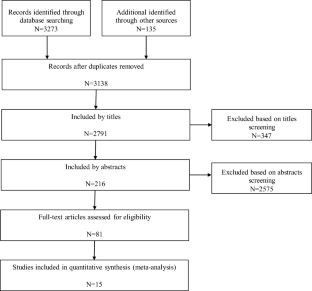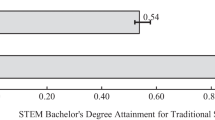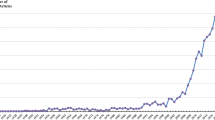Abstract
Although most gifted education programs have included undergraduate research (UGR) in their training plans, scholars have not reached a consensus on UGR’s effectiveness, especially for gifted college students. With a sample of 7460 students from 15 studies conducted worldwide during 1985–2022, this study explores the relationship between research experiences and academic achievement of gifted college students through meta-analysis. The study also investigates the moderating effects of seven variables: research design, research duration, region, publication time, literature type, intervention duration, and major. The results show that research experiences have a significant contribution to the academic achievement of gifted college students. Moreover, research design, literature type, intervention duration, and major are responsible for the differences in the effect sizes of included literature.


Similar content being viewed by others
Data availability
The data that support the findings of this study are available from thecorresponding author upon reasonable request.
References
Abizada, A., & Mirzaliyeva, F. (2021). Success of honors program in Azerbaijan: Do honors students perform better than nonhonors students? Journal of Advanced Academics, 32(2), 160–177.
Altbach, P. G., & Salmi, J. (2011). The road to academic excellence: The making of world-class research universities. World Bank Publications.
Asher, W. (1986). Conducting research with meta-analysis: a new direction for gifted education. Gifted Child Quarterly, 30(1), 7–10.
Asher, W. (2003). Meta-analysis and gifted education. Journal for the Education of the Gifted, 27(1), 7–19.
Astin, A. V. (1993). What matters ill college: Four critical years revisited. Jossey-Bass Publishers.
Beauchamp, A. L., Roberts, S.-J., Aloisio, J. M., Wasserman, D., Heimlich, J. E., Lewis, J. D., Munshi-South, J., Clark, J. A., & Tingley, K. (2022). Effects of research and mentoring on underrepresented youths’ stem persistence into college. Journal of Experiential Education, 45(3), 316–336.
Borenstein, M., Hedges, L. V., Higgins, J. P. T., & Rothstein, H. R. (2006). Comprehensive Meta-Analysis (Version 2.2.027) [Computer software]. Englewood, Biostat.
Boring, E. G. (1923). Intelligence as the tests test it. New Republic (new York NY), 35, 210–214.
Bouchet, N., & Falk, R. F. (2001). The relationship among giftedness, gender, and overexcitability. Gifted Child Quarterly, 45(4), 260–267.
Boyse, T. D., Patterson, S. K., Cohan, R. H., Korobkin, M., Fitzgerald, J. T., Oh, M. S., Gross, B. H., & Quint, D. J. (2002). Does medical school performance predict radiology resident performance? Academic Radiology, 9(4), 437–445.
Brew, A. (2010). Imperatives and challenges in integrating teaching and research. Higher Education Research and Development, 29(2), 139–150.
Bui, S. A., Craig, S. G., & Imberman, S. A. (2014). Is gifted education a bright idea? Assessing the impact of gifted and talented programs on students. American Economic Journal: Economic Policy, 6(3), 30–62.
Carlone, H. B., & Johnson, A. (2007). Understanding the science experiences of successful women of color: Science identity as an analytic lens. Journal of Research in Science Teaching, 44(8), 1187–1218.
Chang, C.-C., & Yu, H.-P. (2021). Follow-up study on college learning performance and career development of science class graduates. Journal of Research in Education Sciences, 66(1), 173–202.
Cheung, A., & Slavin, R. (2013). Effects of educational technology applications on reading outcomes for struggling readers: A best-evidence synthesis. Reading Research Quarterly, 48(3), 277–299.
Clasen, D. R., & Clasen, R. E. (1995). Underachievement of highly able students and the peer society. Gifted and Talented International, 10, 67–76.
Clynes, M., Sheridan, A., & Frazer, K. (2020). Student engagement in higher education: A cross-sectional study of nursing students’ particpation in college-based education in the republic of Ireland. Nurse Education Today, 93, 104529.
Cohen, J. (1988). Statistical power analysis for the behavioral sciences (2nd ed.). Erlbaum.
Cooper, H., Hedges, L. V., & Valentine, J. C. (Eds.). (2009). The handbook of research synthesis and meta-analysis (2nd ed.). Russell Sage Foundation.
Dewey, J. (2005). How We Think: Experience and Education. Translated by Jiang Wenmin People’s Education Press.
Dickersin, K. (2005). Publication bias: Recognizing the problem, understanding its origins and scope, and preventing harm. In H. R. Rothsetin, A. J. Sutton, & M. Borenstein (Eds.), Publication bias in meta-analysis: Prevention, assessment and adjustments (pp. 11–33). Wiley.
Durlak, J. A. (2009). How to select, calculate, and interpret effect sizes. Journal of Pediatric Psychology, 34(9), 917–928.
Ellis, P. (2010). Interpreting effects. The Essential Guide to Effect Sizes: Statistical Power, Meta-Analysis, and the Interpretation of Research Results (pp. 31–44). Cambridge University Press.
Fan, X., & Chen, M. (2001). parental involvement and students’ academic achievement: A meta-analysis. Educational Psychology Review, 13(1), 1–22.
Grangaard, D. (2003). Personality characteristics and favorite topics of students enrolled in introduction to psychology, honors. Journal of the National Collegiate Honors Council, 4(1), 41.
Hedges, L. V. (1981). Distribution theory for glass’s estimator of effect size and related estimators. Journal of Educational Statistics, 6(2), 107.
Hedges, L. V., & Pigott, T. D. (2004). The power of statistical tests for moderators in meta-analysis. Psychological Methods, 9(4), 426–445.
Herzog, S. (2011). Gauging academic growth of bachelor degree recipients: Longitudinal vs. Self-reported gains in general education. New Directions for Institutional Research, 2011(150), 21–39.
Ibata-Arens, K. C. (2012). Race to the future: Innovations in gifted and enrichment education in Asia, and implications for the United States. Administrative Sciences, 2012(2), 1–25.
Johnson, L. S. (1995). The psychosocial development of academically talented college students: An exploratory investigation. College Student Journal, 29, 278–289.
Kim, M. M. (2002). Cultivating intellectual development: comparing women-only colleges and coeducational colleges for educational effectiveness. Research in Higher Education, 43(4), 447–481.
Kim, M. (2016). A meta-analysis of the effects of enrichment programs on gifted college students. Gifted Child Quarterly, 60(2), 102–116.
Kool, A., Mainhard, M. T., Jaarsma, A. D., Brekelmans, M., & van Beukelen, P. (2016). Academic success and early career outcomes: Can honors alumni be distinguished from non-honors alumni? High Ability Studies, 27, 179–192.
Kool, A., Mainhard, T., Jaarsma, D. A., van Beukelen, P., & Brekelmans, M. (2017). Effects of honours programme participation in higher education: A propensity score matching approach. Higher Education Research & Development, 36, 1222–1236.
Kuh, G. D. (2012). High-impact educational practices: what they are, who has access to them, and why they matter. Peer Review: Emerging Trends and Key Debates in Undergraduate Education, 14(3), 29.
Kulik, J. A., & Kulik, C.-L.C. (1984). Effects of accelerated instruction on students. Review of Educational Research, 54(3), 409–425.
Liang, L. L., Fulmer, G. W., Majerich, D. M., et al. (2012). The effects of a model-based physics curriculum program with a physics first approach: A causal-comparative study. Journal of Science Education and Technology, 21, 114–124.
Lindsay, R., Breen, R., & Jenkins, A. (2002). Academic research and teaching quality: The views of undergraduate and postgraduate students. Studies in Higher Education, 27(3), 309–327.
Linn, M. C., Palmer, E., Baranger, A., Gerard, E., & Stone, E. (2015). Undergraduate research experiences: Impacts and opportunities. Science, 347(6222), 1261757.
Liu, B. C. (2004). Basic types and models of undergraduate research in U.S. Research universities. Research in Educational Development, 2004(11), 93–95.
Lopatto, D. (2010). Undergraduate research as a high-impact student experience. Peer Review: Emerging Trends and Key Debates in Undergraduate Education, 12(2), 27.
Marsh, H. W., & Hau, K.-T. (2003). Big-fish-little-pond-effect on academic self-concept: A cross-cultural (26-country) test of the negative effects of academic selective schools. American Psychologist, 58, 364–376.
Mayhew, M. J., Rockenbach, A. N., Bowman, N. A., Seifert, T. A., Wolniak, G. C., Pascarella, E. T., & Terenzini, P. T. (2016). How college affects students 21st century evidence that higher education works. Jossey-Bass.
Melguizo, T. (2011). A review of the theories developed to describe the process of college persistence and attainment. Higher Education: Handbook of Theory and Research:, 26, 395–424.
Mihyeon, K., Jennifer, C., & Tracy, C. (2017). Program development for disadvantaged high-ability students. Gifted Child Today., 40, 87–95.
Moore, A. K. (2012). Do Honors Programs Make a Difference during the First Year of College? The Development of Critical Thinking Skills and Exposure to Good Practices in Undergraduate Education. Graduate Theses and Dissertations Retrieved from https://scholarworks.uark.edu/etd/566
Pascarella, E. T., & Terenzini, P. T. (1991). How college affects students: Findings and Insights from Twenty Years of Research. Jossey-Bass.
Rinn, A. N. (2007). Effects of programmatic selectivity on the academic achievement, academic self-concepts, and aspirations of gifted college students. Gifted Child Quarterly, 51(3), 232–245.
Robinson, N. M. (1997). The role of universities and colleges in educating gifted undergraduates. Peabody Journal of Education, 72(3–4), 217–236.
Roszkowski, M. J., & Nigro, R. A. (2015). The value of SAT scores and high school grades in the selection of honors program candidates from the perspective of honors students and graduates. Strategic Enrollment Management Quarterly, 2(4), 259–293.
Rothstein, H., Sutton, A., & Borenstein, M. (2005). Publication bias in meta-analysis prevention, assessment and adjustments. Wiley.
Saw, K. N. N., & Han, B. (2021). Effectiveness of successful intelligence training program: A meta-analysis. PsyCh Journal, 10(3), 323–339.
Scager, K., Akkerman, S. F., Keesen, F., et al. (2012). Do honors students have more potential for excellence in their professional lives? Higher Education, 64, 19–39.
Seifert, T., Pascarella, E., Colangelo, N., & Assouline, S. (2007). The effects of honors program engagement on experiences of good practices and learning outcomes. Journal of College Student Development, 48(1), 57–74.
Shushok, J. F. (2002). Educating the best and the brightest: Collegiate honors programs and the intellectual, social and psychological development of students [Doctoral Dissertation, University of Maryland]. BP Press.
Sikes, S. S., & Schwartz-Bloom, R. D. (2009). Direction discovery: A science enrichment program for high school students. Biochemistry and Molecular Biology Education : A Bimonthly Publication of the International Union of Biochemistry and Molecular Biology, 37(2), 77–83.
Steenbergen-Hu, S., & Moon, S. M. (2010). The effects of acceleration on high-ability learners: a meta-analysis. Gifted Child Quarterly, 55(1), 39–53.
Thompson, B. (1999). Improving research clarity and usefulness with effect size indices as supplements to statistical significance tests. Exceptional Children, 65(3), 329–337.
Thompson, B. (2010). Q-technique factor analysis as a vehicle to intensively study especially interesting people. In B. Thompson & R. F. Subotnik (Eds.), Methodologies for conducting research on giftedness (pp. 33–52). American Psychological Association.
Vaughn, V. L., Feldhusen, J. F., & Asher, J. W. (1991). Meta-analyses and review of research on gifted programs in gifted education. Gifted Child Quarterly, 35(2), 92–98.
Wenzel, T. J. (1997). What is undergraduate research? Council on undergraduate. Research Quarterly, 17, 163.
Wilson, H. E. (2021). Reflections on experiences at a residential science and math high school: An alumni survey. Journal for the Education of the Gifted, 44(4), 414–431.
Worrell, F. C., Subotnik, R. F., Olszewski-Kubilius, P., & Dixson, D. D. (2018). Gifted college students. Annual Review of Psychology, 70(1), 551–576.
Wu, Y. Y., & Li, S. H. (2019). Academic achievement of students enrolled in the pilot program for training outstanding students in the basic sciences and its influencing factors: An empirical research. Fudan Education Forum, 17(01), 68–75.
Yan, K., & Berliner, D. (2016). Tensions in gifted college programs in China: The case of ‘“mount everest plan.”’ Asia Pacific Education Review., 17, 325–338.
Yu, W., Sun, Y., Miao, M., et al. (2021). Eleven-year experience implementing a dental undergraduate research programme in a prestigious dental school in China: Lessons learned and future prospects. European Journal of Dental Education: Official Journal of the Association for Dental Education in Europe, 25(2), 246–260.
Zigler, A. (2005). The actiotope model of giftedness. In R. J. Sternberg & J. E. Davidson (Eds.), Conceptions of giftedness (2nd ed., pp. 411–436). Elservier.
Zigler, A., & Phillipson, S. N. (2012). Toward a systemic theory of gifted education. High Ability Studies, 23, 3–30.
Funding
Funding was provided by The National Social Science Fund of China (Grant No. BGA220156); Tsinghua University Initiative Scientific Research Program (Grant No. 2021THZWYY01).
Author information
Authors and Affiliations
Corresponding author
Additional information
Publisher's Note
Springer Nature remains neutral with regard to jurisdictional claims in published maps and institutional affiliations.
Rights and permissions
Springer Nature or its licensor (e.g. a society or other partner) holds exclusive rights to this article under a publishing agreement with the author(s) or other rightsholder(s); author self-archiving of the accepted manuscript version of this article is solely governed by the terms of such publishing agreement and applicable law.
About this article
Cite this article
Yan, K., Wei, L., Bu, K. et al. The Effects of Gifted College Students’ Research Engagement on Their Academic Achievement: A Meta-analysis. Asia-Pacific Edu Res 33, 447–458 (2024). https://doi.org/10.1007/s40299-023-00741-1
Accepted:
Published:
Issue Date:
DOI: https://doi.org/10.1007/s40299-023-00741-1




